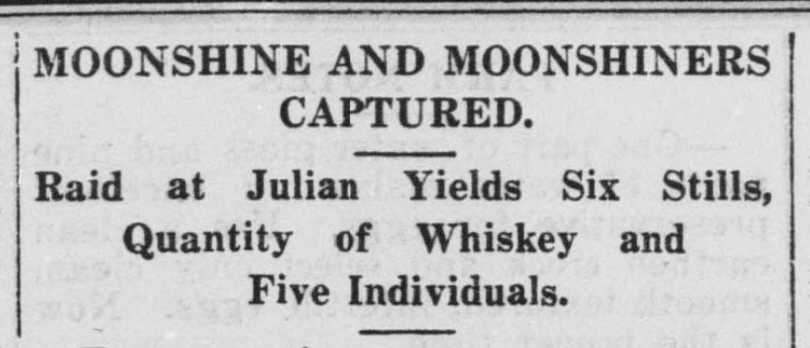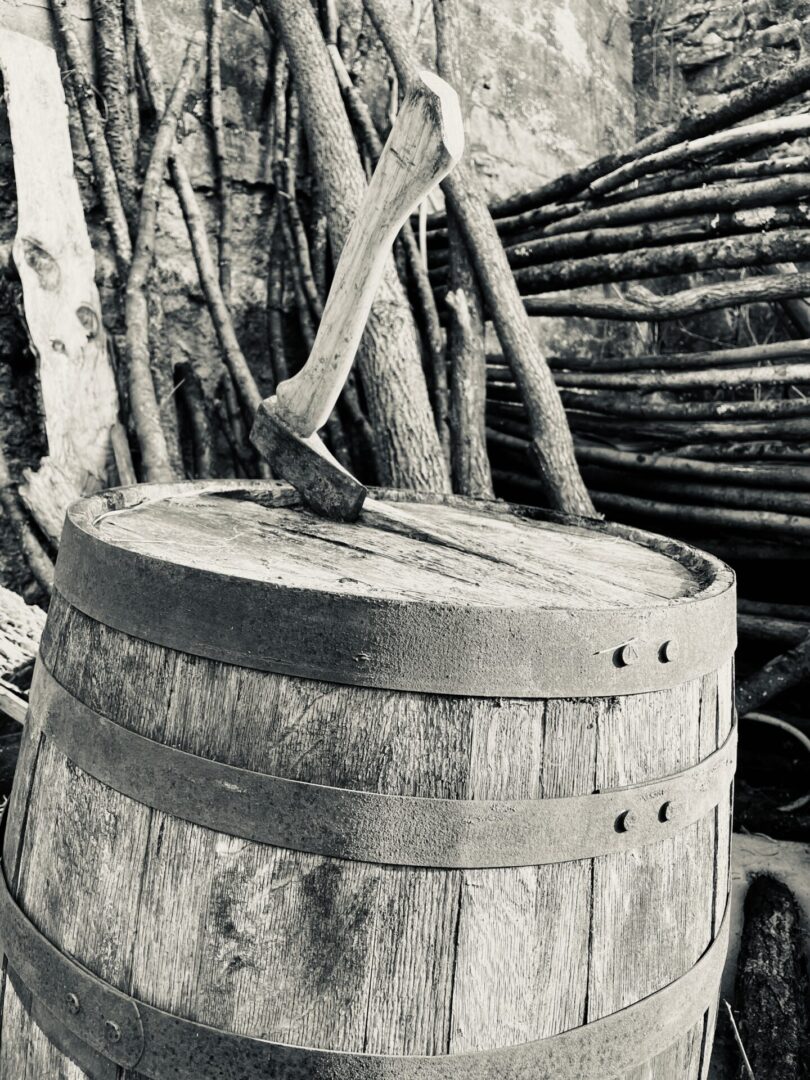The ratification of the Eighteenth Amendment to the Constitution in 1919 was the culmination of temperance movements across the United States. Prayers and protests made in front of saloons during the Women’s Crusade would be answered with a nationwide prohibition of “the manufacture, sale, or transportation of intoxicating liquors.”
While Prohibition was founded upon good intentions and family values, the “noble experiment” backfired, leading everyday citizens to willingly engage in criminal activities. So how did national Prohibition play out in central Pennsylvania? From the passage of the Volstead Act in 1919 until its repeal by the Twenty-First Amendment in 1933, local newspapers revealed local experiences.
In 1919, a married couple was found using an “illicit still” within two blocks of Altoona’s city hall. They were making the “moonshine whiskey” with raisins and had over 3,000 pounds of extra raisins on hand. Their product was being sold to miners nearby.
In 1920, state police on the lookout for stolen vehicles pulled over a truck between Bellefonte and Pleasant Gap at two o’clock in the morning. Upon closer inspection, they found three barrels of whiskey inside onion bags. The men admitted they were from Wilkes-Barre and were delivering the barrels, valued at $1,000 each.
A dozen state police raided the Philipsburg area and arrested the owner of the Central Hotel for having a bottle of moonshine. However, the biggest haul was made at the Moose Lodge. A ten-gallon still was seized at Point Lookout. The spoils were brought to Bellefonte and deposited in the basement of the Centre County jail.

In Houtzdale, Clearfield County, a store was raided on Main Street, where 3,000 bottles of “Jamaica ginger” were confiscated; a homemade still was found upstairs. A second store had an additional 4,000 bottles and 52 cases of the “fiery stuff.”
By 1922, operations by the infamous Prince Farrington were flourishing on his “Florida Fruit Farm” near Loganton, Clinton County. From Sugar Valley, Farrington and his associates engaged in “mammoth moonshine operations, … flooding central Pennsylvania with liquor.”
The Democratic Watchman in 1929 claimed “the biggest cache of moonshine liquor ever found in Centre County” was discovered in a cave in Penns Valley, just west of Tusseyville. A six-by-eight-foot shack, surprisingly, covered a larger underground chamber equipped with “hoisting chains” for lifting the nineteen barrels of aging whiskey.
A “moonshine plant” raided in Julian was known to supply Bellefonte with two- and three-gallon jugs. Six stills and five moonshiners were arrested in July 1924. In nearby Little Sugar Valley, a 1,000-gallon still was found to be in full operation with fourteen vats of 500-gallon capacity each; also, 2,000 pounds of sugar and twenty-five pounds of mash were found. The distillers made their escape, but the federal agents impounded a truck belonging to a man from Salona, Clinton County.
In another moonshine mystery, a convicted bootlegger was found beaten and shot to death in Little Sugar Valley, one week after being paroled from the Centre County jail. A soda bottle full of homemade whiskey was found next to the body.
In February 1929, a dedicated party of “dry raiders” swarmed the Bellefonte area; they “confiscated enough wet goods to make a big dent in the local supply of contraband fire water.” In addition to the arrests, the raiders gathered many keepsakes, such as two ten-gallon stills, eight gallon jugs of white moonshine, a quart of prune whiskey, and over 100 bottles of beer.
A particular home in Coleville was “known among the thirsties” as the “beer garden.” Midnight raids were also made on Halfmoon Hill above Bellefonte in Spring Township.
In State College, a home on East Prospect Avenue was known as a “big booze joint” right under the noses of the college professors. The authorities laid in wait and observed scores of suspicious visits by students. Authorities finally made their move, armed with a search warrant, and seized about four gallons of moonshine and thirty-two gallons of beer (a modest amount these days). While the raid was underway, more students knocked on the door and a burgess greeted them pleasantly and said, “Come right in, boys.”
One moonshiner, who was known to double-distill a superior product, was brought to trial in Bellefonte. He admitted to making moonshine and selling it at $2 a quart but said he did not make much money after taking care of his wife and seven children. He was sentenced to three months in county jail.
A 57-year-old woman from Edendale, near Philipsburg, “holds the jail record for any woman, or man either, in Centre County,” having been incarcerated about eight times over the decade preceding her arrest for moonshining. She carried her Bible to the hearing and said “she would take it along with her to jail.” She was running her illegal booze joint from an outbuilding because her home had recently burned down.
Other rumors and oral traditions from Prohibition days are still whispered in the area. Stories of moonshine from Snow Shoe concealed under coal and transported via railroad to Bellefonte. A milkman in Benner Township who would make “extra deliveries.” Grandmothers even crafted recipes for making dandelion wine in Tyrone.
Prohibition inspired criminal activity throughout central Pennsylvania, from large stills to small, and from gangsters to grandmothers. T&G
Visit townandgown.com for a full list of sources. Local Historia is a passion for local history, community, and preservation. Its mission is to connect you with local history through engaging content and walking tours. Local Historia is owned by public historians Matt Maris and Dustin Elder, who co-author this column. For more, visit localhistoria.com.
Sources
“Big Cache of Moonshine.” Democratic Watchman (Bellefonte, PA), Sept. 27, 1929.
Democratic Watchman (Bellefonte, PA), Nov. 21, 1919. https://panewsarchive.psu.edu/lccn/sn83031981/1919-11-21/ed-1/seq-1/#words=raided+still
“Dry Raiders Invade Bellefonte on Friday.” Democratic Watchman (Bellefonte, PA), Feb. 15, 1929. https://panewsarchive.psu.edu/lccn/sn83031981/1929-02-15/ed-1/seq-8/
“Liquor Plant Raided in Little Sugar Valley.” Democratic Watchman (Bellefonte, PA), Sept. 12, 1930. https://panewsarchive.psu.edu/lccn/sn83031981/1930-09-12/ed-1/seq-4/#words=RAIDED+raiding+still
“Moonshine and Moonshiners Captured.” Democratic Watchman (Bellefonte, PA), July 18, 1924.https://panewsarchive.psu.edu/lccn/sn83031981/1924-07-18/ed-1/seq-9/
“Prince Farrington Wanted.” The Centre Reporter (Centre Hall, PA), July 20, 1922. https://panewsarchive.psu.edu/lccn/sn83032058/1922-07-20/ed-1/seq-1/#words=FARRINGTON+PRINCE
“State Cops Cop Whiskey.” Democratic Watchman (Bellefonte, PA), July 2, 1920.
“Two Bootleggers Sent to Jail.” Democratic Watchman (Bellefonte, PA), March 21, 1924.
The Centre Reporter (Centre Hall, PA), March 31, 1921. https://panewsarchive.psu.edu/lccn/sn83032058/1921-03-31/ed-1/seq-1/#words=alcohol+alcoholic+raided




